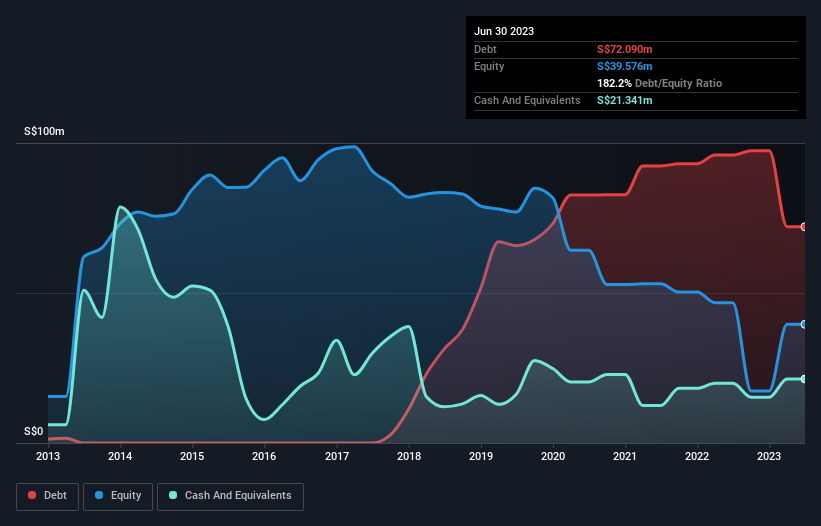Some say volatility, rather than debt, is the best way to think about risk as an investor, but Warren Buffett famously said that 'Volatility is far from synonymous with risk.' So it might be obvious that you need to consider debt, when you think about how risky any given stock is, because too much debt can sink a company. We can see that Soilbuild Construction Group Ltd. (SGX:S7P) does use debt in its business. But the real question is whether this debt is making the company risky.
When Is Debt Dangerous?
Debt assists a business until the business has trouble paying it off, either with new capital or with free cash flow. If things get really bad, the lenders can take control of the business. However, a more usual (but still expensive) situation is where a company must dilute shareholders at a cheap share price simply to get debt under control. By replacing dilution, though, debt can be an extremely good tool for businesses that need capital to invest in growth at high rates of return. The first step when considering a company's debt levels is to consider its cash and debt together.
View our latest analysis for Soilbuild Construction Group
What Is Soilbuild Construction Group's Debt?
As you can see below, Soilbuild Construction Group had S$72.1m of debt at June 2023, down from S$96.0m a year prior. However, because it has a cash reserve of S$21.3m, its net debt is less, at about S$50.7m.

A Look At Soilbuild Construction Group's Liabilities
Zooming in on the latest balance sheet data, we can see that Soilbuild Construction Group had liabilities of S$129.7m due within 12 months and liabilities of S$68.9m due beyond that. On the other hand, it had cash of S$21.3m and S$69.1m worth of receivables due within a year. So it has liabilities totalling S$108.1m more than its cash and near-term receivables, combined.
The deficiency here weighs heavily on the S$51.5m company itself, as if a child were struggling under the weight of an enormous back-pack full of books, his sports gear, and a trumpet. So we'd watch its balance sheet closely, without a doubt. After all, Soilbuild Construction Group would likely require a major re-capitalisation if it had to pay its creditors today. When analysing debt levels, the balance sheet is the obvious place to start. But you can't view debt in total isolation; since Soilbuild Construction Group will need earnings to service that debt. So when considering debt, it's definitely worth looking at the earnings trend. Click here for an interactive snapshot.
In the last year Soilbuild Construction Group had a loss before interest and tax, and actually shrunk its revenue by 13%, to S$235m. That's not what we would hope to see.
Caveat Emptor
Not only did Soilbuild Construction Group's revenue slip over the last twelve months, but it also produced negative earnings before interest and tax (EBIT). Indeed, it lost a very considerable S$30m at the EBIT level. Considering that alongside the liabilities mentioned above make us nervous about the company. It would need to improve its operations quickly for us to be interested in it. It's fair to say the loss of S$27m didn't encourage us either; we'd like to see a profit. And until that time we think this is a risky stock. When analysing debt levels, the balance sheet is the obvious place to start. But ultimately, every company can contain risks that exist outside of the balance sheet. These risks can be hard to spot. Every company has them, and we've spotted 5 warning signs for Soilbuild Construction Group (of which 3 are concerning!) you should know about.
At the end of the day, it's often better to focus on companies that are free from net debt. You can access our special list of such companies (all with a track record of profit growth). It's free.
New: Manage All Your Stock Portfolios in One Place
We've created the ultimate portfolio companion for stock investors, and it's free.
• Connect an unlimited number of Portfolios and see your total in one currency
• Be alerted to new Warning Signs or Risks via email or mobile
• Track the Fair Value of your stocks
Have feedback on this article? Concerned about the content? Get in touch with us directly. Alternatively, email editorial-team (at) simplywallst.com.
This article by Simply Wall St is general in nature. We provide commentary based on historical data and analyst forecasts only using an unbiased methodology and our articles are not intended to be financial advice. It does not constitute a recommendation to buy or sell any stock, and does not take account of your objectives, or your financial situation. We aim to bring you long-term focused analysis driven by fundamental data. Note that our analysis may not factor in the latest price-sensitive company announcements or qualitative material. Simply Wall St has no position in any stocks mentioned.
About SGX:V5Q
Soilbuild Construction Group
An investment holding company, engages in the residential and business space properties construction in Singapore, Myanmar, Malaysia, and internationally.
Very undervalued with outstanding track record.
Market Insights
Community Narratives



